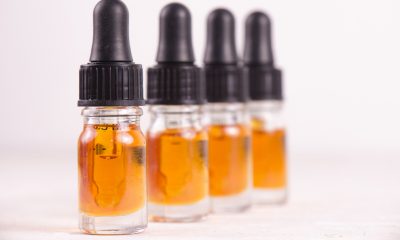The Czech Republic is being urged to recognise natural hemp extracts as ‘traditional foods’ following a recent move by the Ministry of Agriculture to ban the sale of CBD products.
An announcement from the Ministry of Agriculture for the Czech Republic of the intention to ban the use of CBD and other cannabinoids in food has been described as ‘illogical’ by experts in the cannabis and hemp sector.
On Tuesday 25 April, the ministry announced that CBD and other cannabinoids, both hemp-derived and synthetic, are considered Novel Foods under EU regulations and may not be placed on the market without authorisation.
According to a press release, the Czech Agriculture and Food Inspection Authority is set to issue a blanket ban to enforce the regulation, to take effect from June 2023.
The unexpected move took many in Czechia’s cannabis industry by surprise, particularly with the country’s plans to legalise adult-use cannabis due to be debated in parliament imminently.
Recent reports suggest that the legislation is expected to include a 5g daily limit, with the legalisation of its cultivation and distribution, estimated to earn the government around 2 billion Czech crowns (€85 million) per year.
In January 2022, Czechia became the first country in the European Union to raise the permitted limit of THC in hemp products from 0.3% to 1%. Local sources also told Cannabis Health recently that the government was thought to be leaning towards its own framework for the regulation of cannabis-based products.

The national anti-drug coordinator Jindřich Voboril, who is also heavily involved in the regulation of CBD, was reportedly not informed of the move by the Ministry of Agriculture.
He told the Czech media outlet, Cannabis Therapy Magazine: “We are currently preparing a proposal to create a completely new category of psychomodulatory substances, which would also cover CBD hemp and products with up to 1% THC.
“I was not informed in advance of this activity by the Ministry of Agriculture. It would have been better if the Government Office had been consulted. I was a bit surprised and it is not good.”
CzecHemp is an industry body bringing together non-profit organisations, educational and research institutions and businesses active in the cannabis sector.
It has strongly opposed the move, describing it as ‘illogical’ and ‘unnecessary’.
Hana Gabrielová, President of CzecHemp, said: “Regarding novel foods, we have evidence in collaboration with the European Industrial Hemp Association (EIHA) confirming that CBD and other cannabinoids should not be labelled as novel food. If something should be labelled as a novel food, it can only be highly concentrated isolates, most often in powder or crystal form. But not plant extracts produced by traditional methods. Our goal is to ensure, in cooperation with the state authorities, that only safe products that meet the food quality requirements reach the market.”
The recognition of traditional hemp extracts in food
The organisation is also seeking clarification on what the ministry considers to be a novel food, and for authorities to distinguish between hemp extracts containing naturally occurring cannabinoids and highly concentrated isolates’.
“The cannabis sector with CBD and other cannabinoids is worth hundreds of millions of crowns in the Czech Republic, and banning it would harm more than 100 companies with hundreds of employees,” says Jan Martin Paďouk, co-owner of Czech-based CBD company, CannaCare, and vice president of CzecHemp.
“Foods prepared from cannabis to contain phytocannabinoids are a traditional thing in our country, precisely because of their health-promoting properties. We expect the responsible authorities to heed the long-standing call from experts to ensure quality control of CBD products on the market, instead of banning the entire segment, effectively opposing current scientific knowledge, including the WHO conclusions.”
The European Industrial Hemp Association (EIHA) has called on the Czech authorities to recognise natural hemp extracts as traditional foods, filing an official request under Article 4 of the Novel Food regulations.
While isolated and enriched extracts should be considered as Novel Foods, full spectrum extracts containing natural levels of cannabinoids should be declared as traditional food, it says in a press release.
CBD and other cannabinoids have been present in hemp food products for centuries and the history of its consumption is well documented. The use of hemp extracts as food was even endorsed by the European Commission in 1998.
According to EIHA, a ‘balanced, historically accurate, and transparent decision’ on the marketing of hemp extracts is needed.
Daniel Kruse, EIHA President, commented: “We welcome the willingness of the Czech Government to regulate the CBD market in a way that would benefit both consumers and the hemp sector.
“However, we regret that the Czech Ministry of Agriculture considered the possibility to follow the position of some EU Member States that pushed for such a statement, without taking into consideration the use of hemp extracts with natural occurring levels of cannabinoids as traditional food.”
EIHA is said to be providing evidence to the appropriate authorities. If successful in securing the traditional status for natural hemp extracts, companies will not need pre-market authorisation for these products in the Czech Republic, a move which could be replicated in other EU Member States.
Home » Industry » Czech Republic’s move to ban sale of CBD met with criticism

 News6 months ago
News6 months ago
 Science5 months ago
Science5 months ago
 Industry6 months ago
Industry6 months ago
 News6 months ago
News6 months ago
 News5 months ago
News5 months ago
 Health5 months ago
Health5 months ago
 News5 months ago
News5 months ago
 Health3 months ago
Health3 months ago













